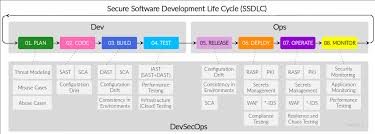Enhancing Software Security with a Secure SDLC Approach
The Importance of Secure Software Development Life Cycle (SDLC)
Secure Software Development Life Cycle (SDLC) is a crucial process that ensures security is integrated into every phase of software development. By implementing security measures from the initial planning stages to deployment and maintenance, organizations can significantly reduce the risk of vulnerabilities and cyber attacks.
Key Phases of Secure SDLC:
- Planning: In this phase, security requirements are identified, and a security strategy is developed to align with business objectives.
- Design: Security architecture and design principles are incorporated into the software design to prevent potential security flaws.
- Implementation: Developers write secure code following coding guidelines and best practices to minimize vulnerabilities.
- Testing: Security testing is conducted to identify and address any weaknesses or vulnerabilities in the software before it goes live.
- Deployment: Secure deployment practices are followed to ensure that the software is securely configured in its operational environment.
- Maintenance: Regular maintenance includes patching vulnerabilities, updating security measures, and monitoring for any new threats.
The Benefits of Secure SDLC:
- Risk Mitigation: By integrating security throughout the development process, organizations can proactively identify and mitigate risks before they become major issues.
- Data Protection: Secure SDLC helps safeguard sensitive data from unauthorized access or breaches, enhancing data protection measures.
- Compliance: Following secure SDLC practices ensures compliance with industry regulations and standards related to data privacy and security.
- Cybersecurity Resilience: Building secure software enhances an organization’s cybersecurity posture, making it more resilient against cyber threats and attacks.
In conclusion, adopting a Secure Software Development Life Cycle is essential for organizations looking to develop robust and secure software applications. By prioritizing security at every stage of the development process, businesses can protect their assets, maintain customer trust, and stay ahead in an increasingly digital world.
Understanding Secure SDLC: Key Concepts and Stages Explained
- What is a secure development life cycle?
- What is secure coding practices in SDLC?
- What is the proper way to secure your SDLC?
- What is a secure SDLC?
- What are the 5 phases of SDLC?
- What are the 5 phases of the security life cycle?
- What are the 7 stages of an SDLC?
What is a secure development life cycle?
A Secure Development Life Cycle (SDLC) refers to a structured approach to integrating security measures into every phase of the software development process. It involves identifying and addressing security requirements from the initial planning stages through deployment and maintenance. By following a secure SDLC, organizations can proactively prevent vulnerabilities, reduce the risk of cyber attacks, and ensure that software applications are developed with security in mind. This comprehensive approach helps build trust with users, protect sensitive data, and maintain compliance with industry regulations and standards related to cybersecurity.
What is secure coding practices in SDLC?
Secure coding practices in SDLC refer to the set of guidelines, best practices, and techniques that developers follow to write code that is resilient to security threats and vulnerabilities. By incorporating secure coding practices throughout the software development life cycle, developers can minimize the risk of introducing security flaws into the codebase. These practices include input validation, output encoding, proper error handling, secure authentication mechanisms, data encryption, and adherence to coding standards. Implementing secure coding practices not only helps in building more secure software but also contributes to overall risk reduction and enhances the resilience of applications against cyber attacks.
What is the proper way to secure your SDLC?
Securing your Software Development Life Cycle (SDLC) involves following a structured approach that integrates security practices throughout the entire development process. The proper way to secure your SDLC includes implementing security measures at each phase, such as planning, design, implementation, testing, deployment, and maintenance. This entails identifying and addressing security requirements early on, incorporating secure coding practices, conducting thorough security testing, deploying software in a secure manner, and regularly maintaining and updating security measures. By adopting a comprehensive and proactive approach to security within the SDLC, organizations can effectively mitigate risks, protect sensitive data, ensure compliance with regulations, and enhance their overall cybersecurity resilience.
What is a secure SDLC?
A Secure Software Development Life Cycle (SDLC) is a systematic approach to integrating security measures and practices into every phase of the software development process. It ensures that security considerations are addressed from the initial planning stages through deployment and maintenance. By following a secure SDLC, organizations can identify and mitigate potential vulnerabilities early on, reducing the risk of security breaches and cyber attacks. This proactive approach helps build secure software applications that protect sensitive data, comply with industry regulations, and enhance overall cybersecurity resilience.
What are the 5 phases of SDLC?
The Software Development Life Cycle (SDLC) comprises five key phases: Planning, Design, Implementation, Testing, and Deployment. In the Planning phase, project requirements are gathered and a roadmap for development is outlined. The Design phase involves creating the architecture and technical specifications of the software. Implementation is where the actual coding takes place based on the design specifications. Testing is crucial for identifying and fixing any issues or bugs in the software before it is deployed. Finally, Deployment involves releasing the software to users after ensuring that it meets all quality standards and security requirements. These five phases form a structured approach to developing software that ensures efficiency, quality, and security throughout the development process.
What are the 5 phases of the security life cycle?
The five essential phases of the security life cycle, commonly known as Secure Software Development Life Cycle (SDLC), are planning, design, implementation, testing, and deployment. In the planning phase, security requirements are identified and a strategic approach is devised to align security measures with business objectives. The design phase involves integrating security architecture and principles into the software design to prevent potential vulnerabilities. During implementation, developers write secure code following best practices to minimize security risks. Testing is crucial for identifying and addressing any weaknesses before deployment, where secure configurations are ensured in the operational environment. Lastly, maintenance includes regular updates and monitoring to address new threats effectively throughout the software’s lifecycle.
What are the 7 stages of an SDLC?
The Secure Software Development Life Cycle (SDLC) consists of seven key stages that are integral to ensuring the security and integrity of software applications. These stages include planning, design, implementation, testing, deployment, maintenance, and monitoring. Each stage plays a crucial role in incorporating security measures into the software development process, from defining security requirements in the planning phase to continuously monitoring and updating security protocols in the maintenance phase. By following these seven stages diligently, organizations can build secure and resilient software that mitigates risks and protects against potential cyber threats.








